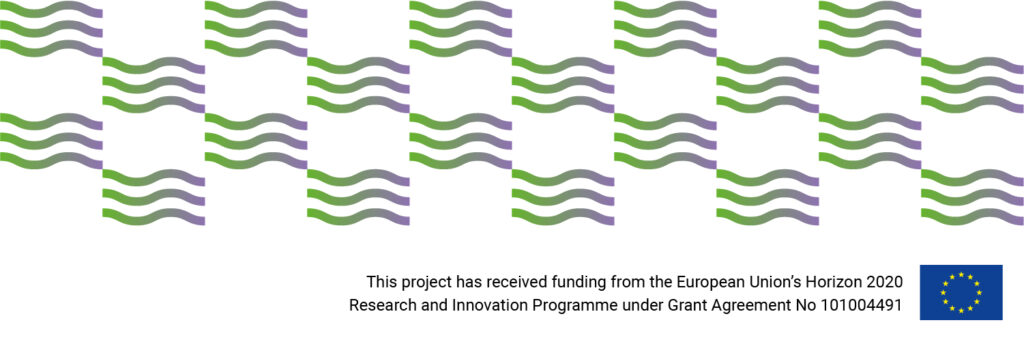Case studies on educational commons

Intoduction
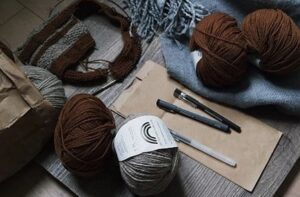
The case studies are planned to be experimental, open and contingent. In this sense, this complements the Open Educational Resources e-Platform and Social Networking Site of the project. Both tools aim to facilitate collaborative work between partners and third parties before and during the development of the case studies.
From the beginning of this task, the intuition and recognition of the multi-inter disciplinarity of the teams and partners, characterised by the different backgrounds, experiences, methodological approaches, and the diversity of settings, contexts, and participants, were situated at the centre of the process.
Our objectives is to favor a global understanding of the diversity and the similarities of the cases and equip the search team with the common kit for the implementation phase.
The pedagogical scenarios and the cases
Fifty-four case studies will be developed between month 13 of the project (February 2022) and month 27 (June 2023). These cases will be distributed along 33 pedagogical scenarios in 8 different countries (Belgium, Estonia, Germany, Italy, Portugal, Spain and Sweden).
Each “pedagoical scenario” incorporates at least at third party, and it is related to CS designs that may be repeated in either the same or o different population. The approach of the Grant Agreement counts the rounds of the case studies as separate entities. Data will be extracted between the first and the second round, which will draw results. It is possible to run the CSs with modifications or even with the different subjects in the second round. As a general trend, there will be two CSs in total for each pedagogical scenario because, on the one hand, it will be implemented with different groups (this probably will lead to different result) and, on the other hand, the partners can make some changes or adjustments after the first implementation.
Geographies of the case studies scenarios
The following map geolocated the different pedagogical scenarios proposed by Smooth partners.
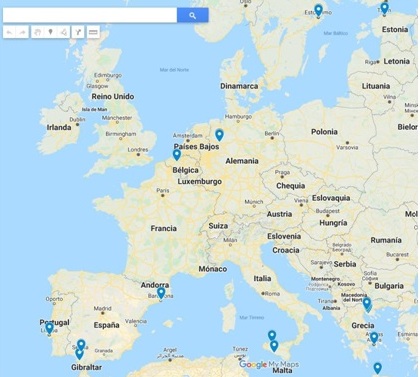
Educational spaces and environments
One of the critical points that grant diversity and give complexity to the Smooth project is that the pedagogical scenarios of the cases are distributed through diverse educational spaces (preschool, school and after school programs) and environments (formal and non-formal education).
Despite this diversity, not all the spaces are equally present. It is interesting that schools will be the least frequent pedagogical scenarios, while most cases will take place with in a non-formal educational setting. In particular, more than 60% of the pedagogical scenarios are situated in a non-formal education environment.
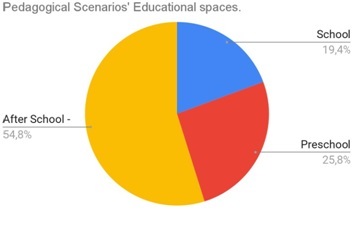

Case studies’ participants
Within these scenarios, the children and young people participating in the cases can reach 700 for the first round.The total number of young people involved is difficult to state in advance because it depends on the number of them that will continue taking part in the following rounds. The age of the children and young people will range from 4 to 17 or even 26 years old (although most cases will work with people under 18), and their profiles will be diverse. The heterogeneity of the participants characterises some cases in terms of gender, economic status, background or nationality (for example, AUTh-Enriching alternative prevention approaches for addiction and psychosocial problems with the concept of educational commons problems, MomUs-CommonGround, Nova-RED: Rights, Equity and Diversity). Others might be much more homogeneous internally. Some cases will work mainly with middle-classpopulations (AUth-The house in the forest) while others with populations facing child poverty and deprivation (MOMUS-‘In and out of synch’; UTh: Reclaiming Place and Mathematics as Commons in Affective Spaces of Learning; UCA-South Zone, Community process; CREA Cerro Amate, UNIPA-the challenges of Media Education and Digital Commons for youth social inclusion). Some cases include refugees and people who have been experiencing migration (MoMus-City as commons; UPF-Communicating Action: Navas and Sant Genís neighbourhoods); people with hearing-related disabilities (MOMUS-Hear we go again), some of them may be feminised (UTh-Wonder Schools). Concerning the types of inequalities experienced by the children participating in the case studies, the most frequently acknowledged by the partners is “educational poverty”, followed by a recognition of the overlapping of different inequalities (gender, economic,ethnicity,ability…).
Regarding the teachers and educators, there might be approximately 200 adult participants for the first round.
Goals and expectations + word cloud
It is a challenge to summarise the diversity of expectations, objectives and goals embedded in the pedagogical scenarios the partners will implement in the SMOOTH project. However, its representation through a word cloud can be helpful in this sense (see illustration). The range of the clouds’ assortment shows the richness the consortium of partners has produced within the design stage. To illustrate this tendency, notice the frequency with which concepts as empowerment/empowering of children and youth are present in connection with their role as commoners and apply principles for commoning practices. Many cases emphasise this concept as UPF-Empowering El Raval, UTh-WONDER Schools, AUTh-Mesopotamia Solidarity School, AUTh-The House in the Forest, MOMus-City as commons, and Tal Tech- Open Space for Mental Health, among other cases.
Experimentation is also are petitive objective that connects participation, arts, values, media literacy, democracy, interdependency and critical thinking as commoning practices. Designs as those can be seen in cases as UTh-Libertarian education of the commons: collectivisation of learning and knowledge by preschool children, MOMus – ‘In and out of synch’: creative dialogues between Russian Avant-garde art and young people’s music-based experimentations, UCA -South Zone Community Process-Young Zone, or MOMus- “HEAR, WE GO AGAIN”.
Co-creation of artistic pieces, knowledge, the transformation of culture, development of methodology, models for peer production and learning are recurrent ideas that shape the proposals of MAU – Taking place and making sense – Equal public education for all children, MOMus-COMMONGROUND, AUTh-Self-Regulated Learning (SRL), NOVA-RED. Rights, Equity and Diversity, UMinho-Mapping of children’s spaces, UOS-Planning a Scooter Park, Scooter Riding, Scooter Workshop, and more instances of case studies designs that include those ingredients in various proportions.
Illustration of Main goals and expectations word cloud
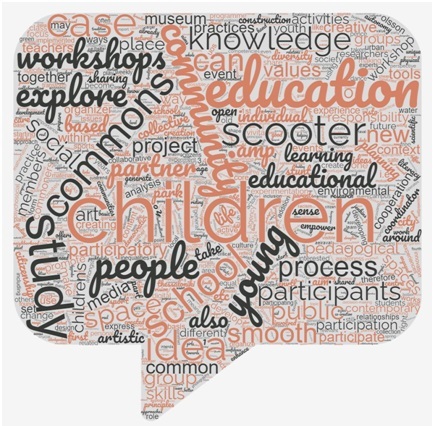
Previous knowledge / experiences on the philosophy of the commons
The information provided by the partners reveals diversity in the level of third parties’ experiences on the application of the philosophy of the commons. Thus, on the one hand, a considerable number of participants have never or rarely used the philosophy of the commons. However, it is necessary to remark that many of them feel that they have used similar approaches but not under this specific conceptualisation. On the other hand, we find that more than half of the third parties have experimented with the commons occasionally or more.
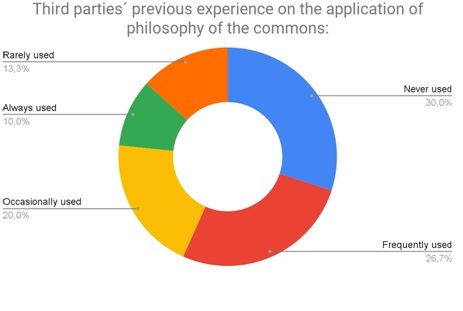
Previous knowledge / experience on the pedagogical methodologies and practices
It is also essential to analyse third parties’ ex-ante experience of applying the pedagogical tools and methodologies at the Smooth project’s basis. The following graph (Graph 3), on the one hand, reveals one positive factor: each of these tools is already being applied by almost all third parties in half or more pedagogical scenarios. “Project work” and “Pedagogical documentation” are the two ones more often used. However, indeed, around one in five of them have never used “Conflict resolution”, “Peer governance”, “Pedagogical documentation”, or “Pedagogy of Listening”. This needs to be taken into consideration and addressed when designing and applying the cases in parallel to the training process.
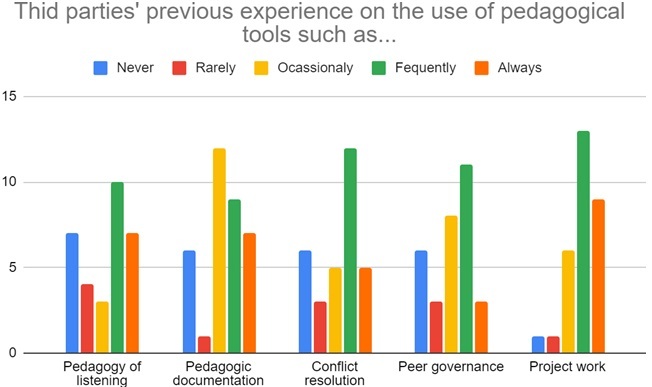
Although this quantitative and standardised data is revealing, it is also essential to balance it with the more elaborated information collected with open questions about the parties’ familiarity with the methodologies. In this sense, it is important to acknowledge that one case study can involve different third parties that may not be on the same page concerning their previous experience on the methodologies.
